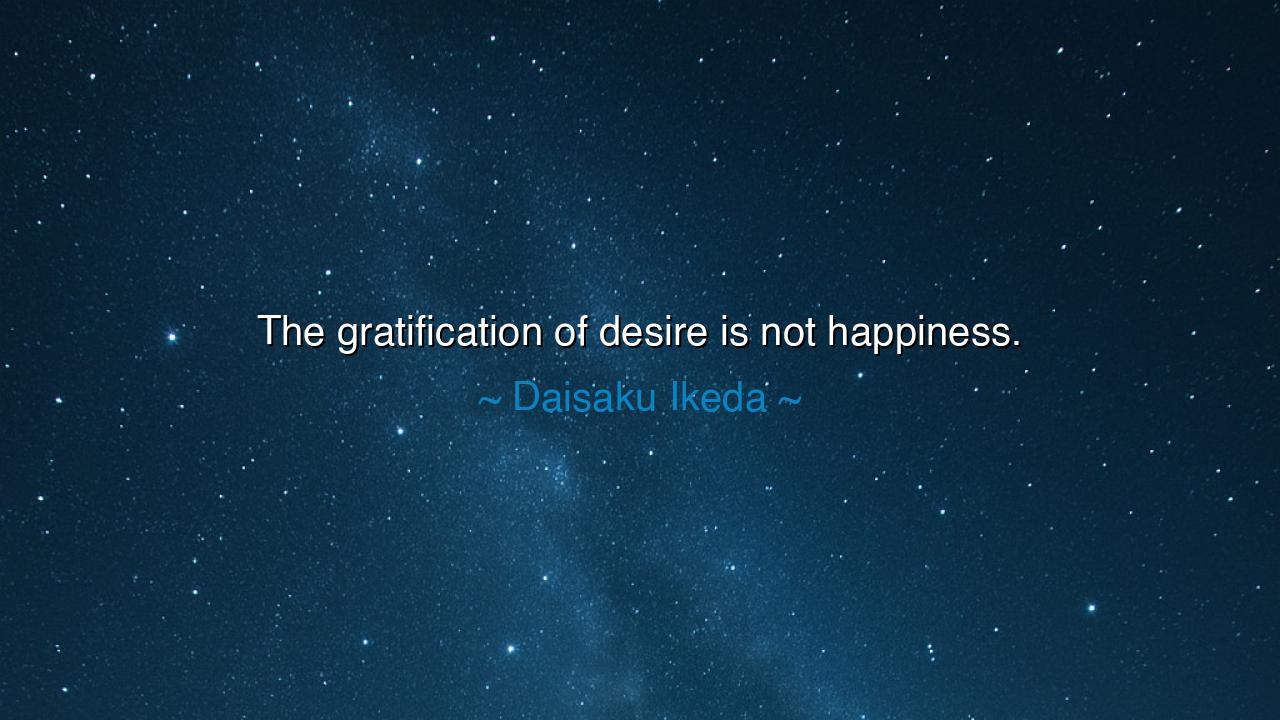
The gratification of desire is not happiness.






“The gratification of desire is not happiness.” So teaches Daisaku Ikeda, the modern philosopher and peacebuilder whose words echo the timeless wisdom of sages past. These few, simple words pierce through the illusions that have bound humanity for ages — the belief that by fulfilling our every wish, we shall find peace. Yet the master reminds us: desire, like a flame, grows brighter and hungrier the more it is fed. To gratify it is not to quench its fire, but to feed it until it consumes the heart. Thus, true happiness cannot be born from the endless chase of craving, but only from the stillness that arises when one masters it.
In every age, man has mistaken the satisfaction of desire for the fullness of joy. He believes that when he attains wealth, fame, love, or power, he will be content. But desire is a trickster spirit — it whispers, “Just this one thing,” and when that thing is attained, it points to another. The cup of desire can never be filled; it leaks through the bottom. Ikeda, steeped in Buddhist thought, reminds us of this ancient truth: that craving leads to suffering, and that happiness lies not in possession, but in liberation — the freedom from the endless hunger of wanting.
Look to the story of Emperor Ashoka, the mighty conqueror of India. His desires were vast as the horizon; his ambition, boundless. He subdued kingdoms, and his banners flew over lands soaked in blood. Yet when he looked upon the slain after the battle of Kalinga, his soul trembled. He saw not triumph, but the emptiness of victory. The gratification of desire — power, conquest, dominion — had given him everything he wanted, and yet robbed him of peace. From that sorrow, he turned inward and found what the world could not give: inner transformation. Renouncing war, he sought not to rule others but to master himself. And in that mastery, he discovered true happiness, serene and enduring.
To understand Ikeda’s wisdom, one must see that desire itself is not evil. It is the spark of life — the longing to grow, to create, to love. But when desire rules the soul, it becomes a tyrant; when the soul rules desire, it becomes a servant. The gratification of desire is fleeting, like the taste of honey upon the tongue — sweet for a moment, then gone. True happiness, by contrast, is a flame that burns steadily even when the world grows dark. It arises not from taking, but from giving; not from fulfilling every want, but from being at peace with what already is.
Consider the lives of those who walk quietly in compassion — the teacher who gives without glory, the mother who sacrifices in silence, the artist who creates for love and not for fame. Their joy is not born from gratification but from meaning, from harmony with the deeper rhythm of existence. They do not chase happiness; they embody it. Like a still pond reflecting the heavens, their hearts remain calm, unshaken by the storms of desire. They have learned the secret: that happiness is not found in what one acquires, but in what one awakens within.
And so, dear seeker, take heed: when next your heart burns with wanting, pause and ask, “Will this truly bring peace?” Let your desires arise, but do not become their servant. Seek not to extinguish them, but to understand them. Transform craving into purpose, and longing into gratitude. For when one lives with awareness and compassion, every breath becomes a gift, and even the smallest act becomes radiant with joy.
The lesson of Ikeda’s words is both gentle and powerful: happiness is not the fruit of satisfaction, but the soil from which satisfaction grows. Desire fulfilled will fade; peace discovered within will endure. Therefore, pursue not the fleeting pleasures of the senses, but the steady light of wisdom. Cultivate compassion, practice mindfulness, and anchor your joy in the unchanging core of your being.
For in the end, when all desires have been spent and all illusions have fallen away, what remains is the quiet truth: the heart that seeks nothing possesses everything. And in that sacred stillness — beyond want, beyond fear — lies the eternal spring of happiness that Daisaku Ikeda spoke of, the happiness that neither time nor loss can take away.






AAdministratorAdministrator
Welcome, honored guests. Please leave a comment, we will respond soon